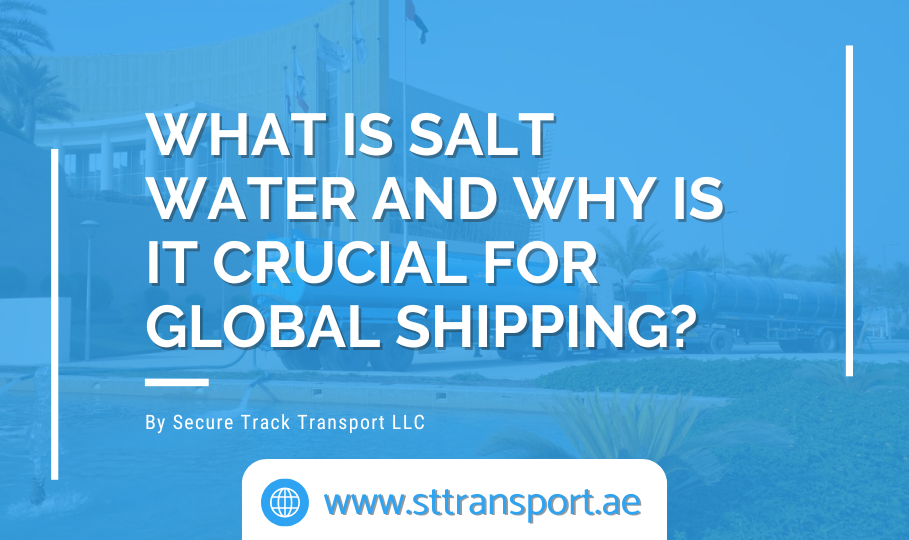Ever wondered how the goods you use daily make their way to your local store? It’s all thanks to the vast, salty expanse of our planet’s oceans and seas. Salt water is more than just the stuff you swim in during a beach vacation—it’s the lifeblood of global shipping. Without it, the movement of goods, from cars to coffee, would grind to a halt. But what exactly is salt water, and why is it so vital to the shipping industry? Let’s dive in!
What is Salt Water?
Salt water is exactly what it sounds like—water that contains significant concentrations of dissolved salts, primarily sodium chloride. It makes up about 97% of Earth’s water and is primarily found in the oceans and seas. While we can’t drink it, salt water plays a crucial role in supporting life on Earth, especially in marine ecosystems. The sheer volume and vastness of salt water bodies are what make them the perfect highways for international trade.
The Role of Salt Water in Global Ecosystems
Salt water is home to an incredible range of biodiversity, from tiny plankton to the largest whales. Oceans regulate the planet’s climate by absorbing heat and carbon dioxide, helping to mitigate the effects of global warming. Without salt water, our planet’s climate would be wildly unpredictable, and marine life would suffer. In short, salt water is not just for ships—it’s vital for maintaining balance in our environment.
Global Shipping: A Brief Overview
Global shipping is the backbone of international trade. It involves the transportation of goods across the globe via sea routes, using massive vessels that navigate through salt water. From electronics and clothing to fuel and food, nearly 90% of the world’s goods are transported by sea. This reliance on the vast oceans makes salt water indispensable to the modern economy.
Why Salt Water is Crucial for Global Shipping
Global shipping wouldn’t exist without salt water. The major shipping routes crisscross oceans and seas, forming the world’s most efficient transport network. Salt water provides the vast, open spaces that large cargo ships need to navigate. Unlike rivers or man-made canals, the oceans offer endless pathways, making long-distance, international shipping possible.
Types of Vessels Used in Salt Water
Various types of vessels are designed to withstand the rigors of salt water, including:
- Cargo ships that carry containers full of goods.
- Oil tankers that transport crude oil across oceans.
- Salt water tanker supply vessels, play a crucial role in supplying ships with fresh water and other necessities during long voyages.
Salt Water Tanker Supply
Salt water tanker supply vessels ensure ships have everything they need for their long trip across oceans. These specialized salt water tanker services often provide fresh water, fuel, and even food to ships that spend weeks or months at sea. They’re the lifelines of the shipping industry, ensuring that global trade can continue without interruption.
Challenges Faced by Shipping in Salt Water
While salt water is essential for shipping, it also presents unique challenges. Salt is corrosive, meaning it can wear down ships over time. Engineers must design ships with special coatings to resist corrosion. Then there’s the weather—ships face rough seas, storms, and unpredictable conditions that can make shipping hazardous.
How Salt Water Affects Ship Design
To combat the corrosive nature of salt water, ships are built with materials and coatings that can withstand the harsh ocean environment. Engineers play a crucial role in ensuring that ships remain seaworthy, even after years of exposure to salt water. Additionally, ship designs have evolved to be more aerodynamic and fuel-efficient, adapting to the demands of long sea voyages.
Technological Advancements in Salt Water Shipping
Technology has revolutionized how we navigate salt water. Modern ships are equipped with advanced navigation tools, such as GPS and sonar, allowing them to travel the most efficient routes. Innovations in materials have made ships more resistant to corrosion, while renewable energy sources, like solar and wind power, are being integrated into modern vessels to make shipping more sustainable.
Environmental Impact of Shipping in Salt Water
While global shipping is necessary, it also has a significant environmental impact. Oil spills, waste dumping, and ship emissions can harm marine ecosystems. International regulations, such as MARPOL, aim to reduce pollution from ships and protect our oceans. Many shipping companies are now investing in greener technologies to minimize their ecological footprint.
The Future of Salt Water and Global Shipping
As the world becomes more interconnected, the demand for global shipping will continue to rise. However, the industry faces challenges such as climate change, which could alter shipping routes due to melting ice caps and rising sea levels. Technological advancements, like autonomous ships and sustainable fuel sources, could shape the future of salt water shipping.
Economic Importance of Salt Water Shipping
Salt water shipping is crucial to the global economy. It supports millions of jobs, from shipbuilders and sailors to port workers and logistics coordinators. The shipping industry is also responsible for the majority of global trade, helping countries exchange goods and services across continents. Without salt water shipping, our globalized world simply wouldn’t function.
Conclusion
Salt water isn’t just the stuff you find at the beach—it’s the engine that powers global trade. Without the vast oceans, shipping goods from one corner of the world to another would be impossible. While there are challenges associated with salt water, from corrosion to environmental concerns, technological advancements continue to push the industry forward.



